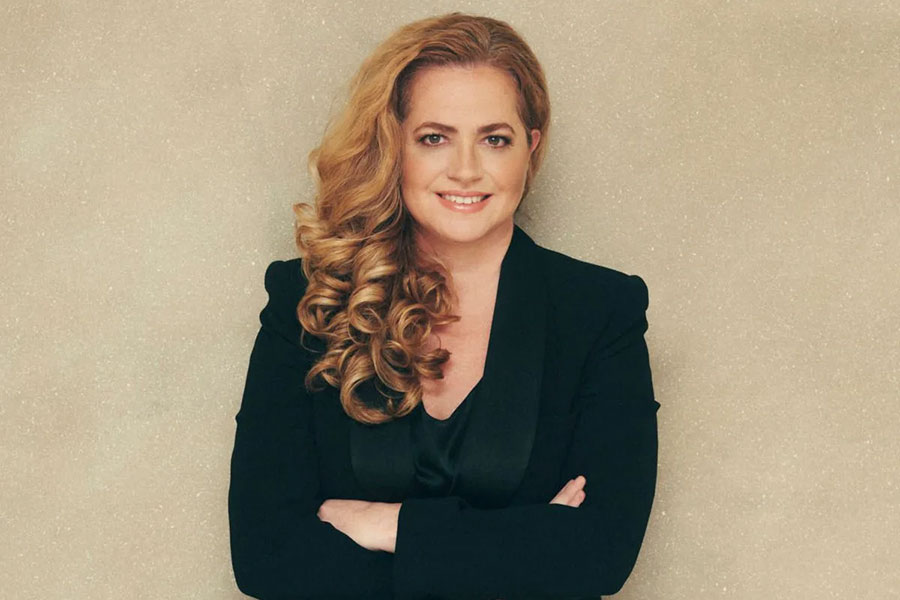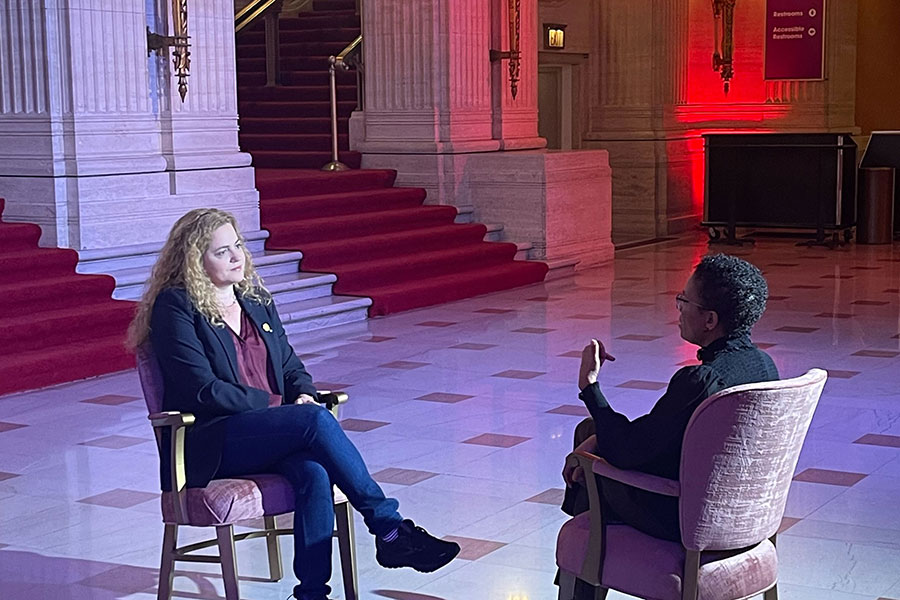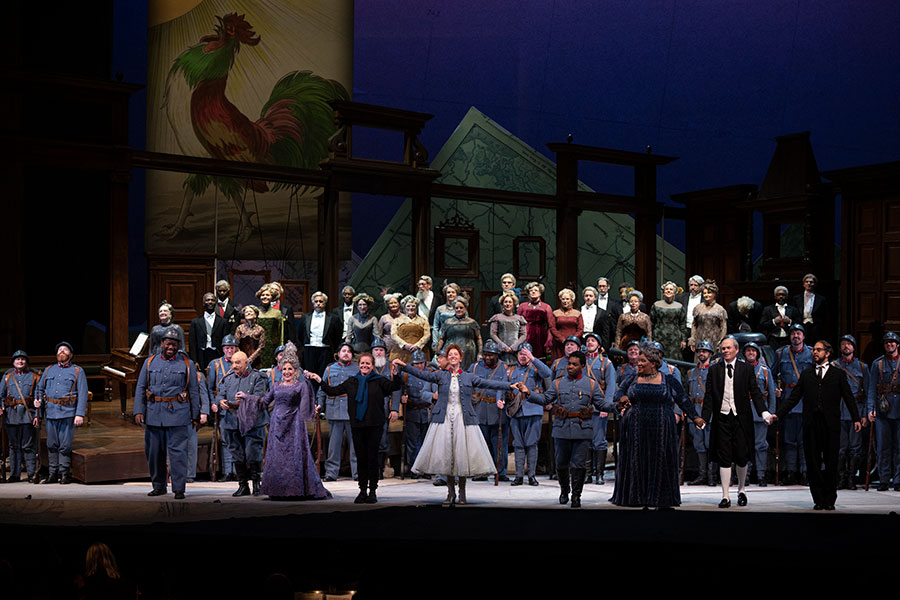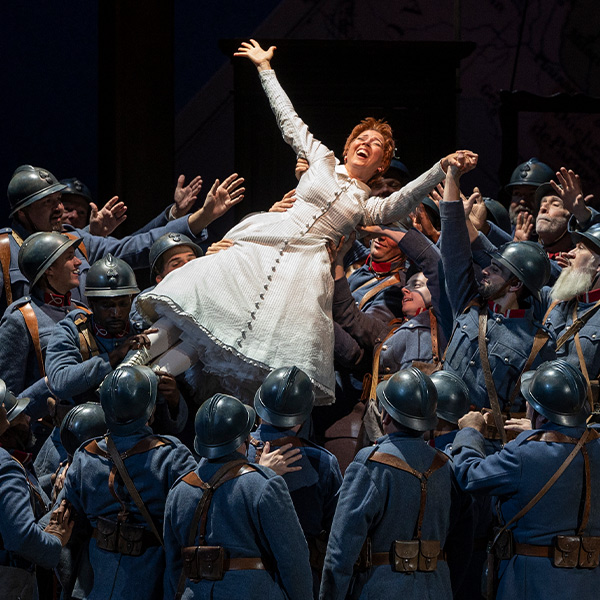November 20, 2023
Leading the charge
A Q&A with The Daughter of the Regiment conductor Speranza Scappucci
What was your first exposure to classical music that made you want to make it your career?
I have been exposed to music since I was born. Growing up in Italy, my parents were big music lovers – especially my father, who is a big opera fan and classical music lover. So although my parents were not professional musicians, music always surrounded me, and I don't remember my life without music. I started taking piano lessons when I was 4, and around the time I was 9 my teacher told my parents that I had real talent. My parents then let me enroll in the Santa Cecilia conservatory in Rome, and after completing my studies there I was accepted into The Juilliard School in New York. It was then I realized that music would be my life.

After graduating from Juilliard, you began your career as a collaborative pianist before becoming a conductor. What was that transition like?
I graduated from Juilliard in solo piano, and then I did a master's in collaborative piano. Because of my early exposure to opera, I developed a great attraction to that repertoire. I loved working with singers, I did a lot of song repertoire, and I decided to become a coach. I worked for New York City Opera, and even came to Chicago more than 20 years ago to do two projects with Chicago Opera Theater in the era of Brian Dickie. I was Dame Jane Glover's pianist for two productions. I also worked for the Glimmerglass Festival and Santa Fe Opera, and then eventually moved over to the European scene, where I did a lot of operas at the Glyndebourne Festival and then at the Vienna State Opera.
It was while I was in Vienna that I then met Maestro Riccardo Muti, and I became his pianist and coach for many years on many projects, including his Otello at the Chicago Symphony Orchestra in 2011. I enjoyed these many years of collaborative piano and preparing all the singers and the chorus, but I began to want to do more to shape the music, to be the person who really takes charge. At some point, I just decided I needed to try, and I got my first experience at Yale University with a Così fan tutte in 2012. And from there, everything else started to happen, both in the opera and in the symphonic repertoire, which I also love.
I wouldn't say I met obstacles, it was more about deciding within myself that it was the right time to become a conductor. And at that moment in time – 2012 – more and more women were coming up and being accepted as conductors. And I'm happy there was a place for me in the conducting world.
Speaking of women in the conducting world, you are a champion of the title Maestra – what should opera fans know about why that's an important distinction from Maestro?
In English there is no masculine or feminine for the word conductor, but there is in Italian, German, and French. The word maestro is still a word that comes from the Italian language, which itself is derived from a Latin word magister, which also has a feminine counterpart, magistra. So we have that option in our language, and I think it is just a question of habit. I always tell my orchestras and my singers: if you are comfortable, please call me maestra. If you'd rather say maestro, I don't get offended. Call me Speranza, that's fine, too. But I do feel that in the Italian language, since this is an Italian word and there is a feminine declination to that word, why not use it? Especially because now there are so many women conductors. When people start to use the title maestra, they will get used to it and then it won't be so unfamiliar anymore.

In this interview, Maestra Speranza Scappucci tells NBC's LeeAnn Trotter why The Daughter of the Regiment is a must-see this fall. Watch the full video here.
Who were the mentors that shaped your career?
I think I am the musician I am today thanks to all my teachers that I had as a pianist, as well as those who gave me my first chances or big breaks as a conductor. So my first piano teacher in Rome and my teachers at the Santa Cecilia conservatory were my first mentors. And then when I was at Juilliard, I had many, many great teachers; Samuel Sanders was my collaborative piano teacher, and I also studied with Brian Zeger and Diane Richardson. Corradina Caporello was an amazing Italian diction and talent repertoire coach that I learned so much from. When it comes to conducting, the people who gave me my first chances, like Doris Yarick-Cross at Yale and Francesca Zambello at the Glimmerglass Festival and Washington National Opera. In Europe. Francesco Micheli gave me my first debut in Italy, and Dominique Meyer at the Vienna State Opera and later at La Scala, where I became the first Italian woman to conduct at this legendary theater.
What is your relationship to The Daughter of the Regiment — when did you first see it, and when did you first work on it?
So this is a great question! The very first time I was exposed to this piece was when I was a coach and pianist at the Vienna State Opera in 2007. This very same Laurent Pelly production had just started its trip around the world, and I was the pianist for its premiere in Vienna. I also played the piano in the Music Lesson scene in the second act! And then funnily enough, it came back into my career as a conductor; in 2015, I made my Santa Fe Opera debut with a beautiful production directed by Ned Canty, and then I conducted it in a semi-staged version at the Zurich Opera for my debut there. And now it is the piece for my Lyric debut. So it is an opera that has appeared at very important times in my career.

Maestra Scappucci joins the cast of The Daughter of the Regiment onstage for a bow during the final Dress Rehearsal.
Tell me about working with this stellar cast – you've worked with both Lawrence Brownlee and Lisette Oropesa before, right?
Yes, they are both great friends. Larry is an incredible artist, and I think in this repertoire he is one of the very best in the world. But what I love about Larry is that he's such an easygoing person and he's so nice to work with, a very collaborative artist. And I can say the same about Lisette; this is already my fourth project with her. She is somewhat of a lucky charm for me because she's been present in many of my historic debuts, like my debut in Barcelona in 2020 and my debut at La Scala in 2022. She's an immense artist, not only vocally, but musically. She is really a dream to work with.
I always feel like there's a special connection musically when I work with Lisette and Larry, and I feel very lucky that I am with both of them for this production at Lyric.
How are you finding Chicago – any favorite spots?
Well, I've been to Chicago many times, but every time I've been here, it was during the brutal winter season, so this is the first time I have been here with such pleasant weather! I love the Chicago Riverwalk and window shopping up and down the Magnificent Mile. During this production I am staying in the West Loop, which is new to me. I love this part of town, it's very village-like, and there are so many interesting restaurants and bars. I'm in the middle of Greektown, so it makes me feel like I'm in more of a Mediterranean setting. I love Chicago – its architecture and its energy – and I love that the people here are so relaxed and easygoing. I've been having a wonderful time!

